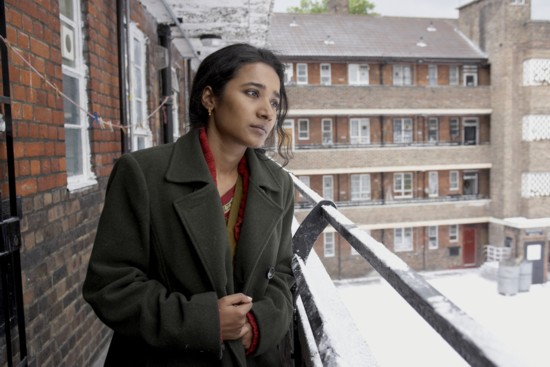|
Reviews of Recent Independent, Foreign, & Documentary Films in Theaters and DVD/Home Video
Director Sarah Gavron Produced by Alison Owen & Christopher Collins Written by Abi Morgan, Laura Jones, based on the novel by by Monica Ali Director of Photography, Robbie Ryan Edited by Melanie Oliver Music by Jocelyn Pook Released by Sony Pictures Classics UK. 102 min. Rated PG-13 With Tannishtha Chatterjee, Satish Kaushik, Christopher Simpson & Naeema Begum Early in Brick Lane, 17-year-old Nazneen walks hand-in-hand to the river’s edge with her younger sister, her father, and other villagers in tow, wearing a dazzling yellow sari and traditional Bengalese wedding makeup. She gets onto a tiny boat and is pulled away from her family, her village, and Bengal. When we next see Nazneen (Tannishtha Chatterjee), she is an adult with two daughters living in a flat on East London’s Brick Lane with a fat, older husband, Chanu (Satish Kaushik), whose touch she endures. She goes about her daily life numb and silent, living for the letters from her sister in Bengal, and fantasizing about the days in the village before her mother’s suicide, when she and her sister played and sang in long grasses. Nazneen has faced tragedy in London, too. Her first child, a boy, died in his crib as a baby. Brick Lane is the story of Nazneen coming back to life, waking up, growing up, and finding her beauty and her independence. This kind of theme is often heavy-handed in films, made either relentlessly depressing (forcing the viewer to wonder throughout why the protagonist settles for such a miserable life), or worse, cloyingly transcendent. Director Sarah Gavron’s debut dramatic feature thrillingly avoids every trap and cliché. Nazneen’s awakening is organic and subtle – it’s easy to understand and relate to her depression and passivity early in the story, and the moments of her transformation are profoundly inspiring and believable. Nazneen finds her power through a series of small changes – a new friend gives her a sewing machine, and she starts making her own money. A vibrant, political young man, Karim (played by the heart-stoppingly beautiful Christopher Simpson), comes to deliver sewing material while her husband is at work. Over the next few months, the attraction between them builds. Through Kareem, she ventures alone to a community meeting dedicated to defending the Bengali community against a local racist organization. Nazneen's sexual, political and personal coming of age is not linear or black and white. One of Gavron’s great directorial strengths is in capturing the different atmospheres that are created by the various relationships, which merge kaleidoscopically. Seamlessly strong performances (including an impressive debut from 14-year-old Naeema Begum as Nazneen’s oldest daughter Shahana) contribute to the film’s complexity.
Ultimately, Brick Lane is an immigrant and a feminist story, without either being heavy-handed. During the on-location
filming in 2006, there were some protests from activists in Brick Lane’s Bengali community, who were concerned that their neighborhood would be
portrayed negatively. But actually, the film celebrates Brick Lane and the people who live there. Its most important lesson is how many worlds can
coexist in one space, and how human relationships are also beautifully paradoxical.
Elizabeth Bachner
|

